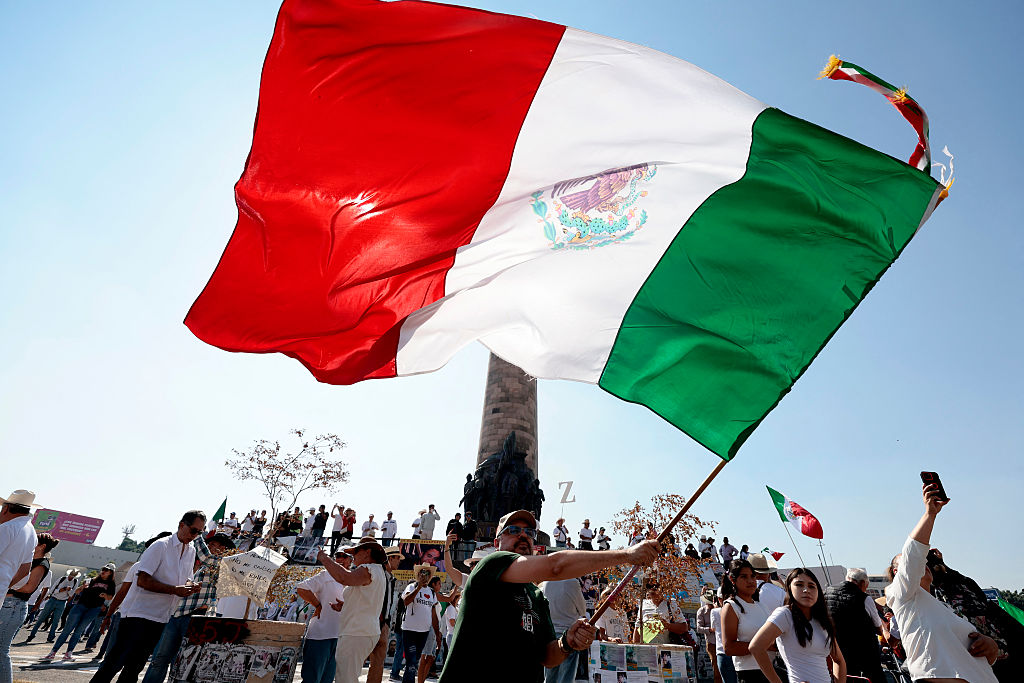
www.theamericanconservative.com
Crime and Disorder Unleash Protests in Mexico
Foreign Affairs
Crime and Disorder Unleash Protests in Mexico
But the government still maintains tight control over the political situation in the country.
(Photo by ULISES RUIZ/AFP via Getty Images)
Violent, black-clad demonstrators tore down security barriers in Mexico City last Saturday, using them as battering rams against lines of police guarding the National Palace at the capital’s famed Zócalo town square. In Guadalajara, rioters smashed windows and set fire to entrances of the state legislature. Thousands of peaceful protesters marched with signs and chanted: “Fuera Morena! Basta de inseguridad! Justicia para Carlos Manzo!” More than 100 police officers were injured and dozens of demonstrators arrested amid the chaos.
The “Generation Z” protests, which kicked off the day after the gruesome public murder of popular independent mayor Carlos Manzo, are the first real token of resistance the government of Claudia Sheinbaum has faced during her term as president. Her political party, Morena, continues to hold a dominating position in Mexican politics at all levels, making her the obvious focus for popular discontent over Mexico’s continued issues with crime, corruption, and public disorder.
Manzo’s death has been particularly damaging to Sheinbaum’s image as a crimefighter and enemy of the cartels. Manzo was originally a member of Morena, but left the party to contest the mayorship of the city Uruapan as an independent. A charismatic figure easily identifiable by his characteristic broad-brimmed hat, Manzo swept to the mayor’s office on a platform of mano dura against the cartels, which have ravaged Uruapan and the larger state of Michoacán.
The new mayor publicly broke with Sheinbaum over security matters. Manzo sharply criticized her stated adherence to her predecessor Andrés Manuel López Obrador’s “hugs not bullets” security strategy, instructing his own police forces to dispatch any armed criminals that attacked the public or attempted to resist arrest. In turn, Sheinbaum in October pulled out 200 National Guard troopers that had been stationed in the city, leading Manzo to protest that the federal government was leaving the city “vulnerable in the face of the illegal activities of organized crime” and adjuring the president not to “leave Uruapan alone in the fight against federal crimes which are the responsibility of the federal government to manage.”
That decision has come back quickly to haunt Sheinbaum’s government. On November 1, Manzo was shot seven times by an assassin while attending the city’s annual Day of the Dead celebration. The public has not been tardy in connecting Manzo’s criticism of Sheinbaum and her decision to pull troops out of the city with his death. Rumors have circulated online that Manzo was actually murdered on Sheinbaum’s orders through corrupt connections with cartels—a perennial suspicion in a country thick with corruption and assassinations.
The murder served as a catalyst, galvanizing various groups frustrated with the Sheinbaum administration’s handling of organized crime and with the continued futility of Mexico’s national struggle against corruption. The next day, protestors gathered in Morelia, the capital of Michoacán, to demonstrate against cartel crime and Morena. Agitators broke into the state government’s executive mansion and began throwing furniture out the windows and attempting to light the building on fire.
Other groups began organizing similar marches and demonstrations across the country. The Mexican opposition, including figures from the Institutional Revolutionary Party (PRI) and the National Action Party (PAN), seized on the discontent and began promoting the protests on their social media channels as well, leading Sheinbaum and her allies in Morena to denounce the protests as an astroturfed operation by the Mexican “far-right.”
The movement culminated in the grand protest in Mexico City on November 15, which gathered around 17,000 demonstrators and ended in the violent clash with Mexican police on the steps of the National Palace—no massive popular mobilization, but a notable outbreak of serious unrest and frustration with the still-popular Sheinbaum administration. The movement has briefly put Morena on the back foot and allowed the Mexican right to take the position of protagonist, a desperate necessity for the PAN and PRI, which have been so thoroughly routed by Morena during the past decade that they are teetering on the brink of political irrelevance.
Both parties have clearly taken the message to heart, and are refocusing their attacks on the administration in the language of corruption and crimefighting. Morena has a number of scandals of its own that have diminished its credibility as a champion of anti-corruption: the close relationship between high-ranking Senator Adán Augusto López and a cartel leader involved in a military fuel theft scandal; the revelation that former president López Obrador’s sons were traveling abroad to luxurious resorts while their father lectured the nation on the principle of “republican austerity;” and the conspicuously rapid enrichment of officials across the party. Such scandals have eroded the party’s position as an anti-establishment insurgency attacking the ill-gotten gains of PRI and PAN politicians.
So far, the attacks have yet to make a major dent in the image either of the president or her party: Morena is still the most positively viewed political force in the country, and vastly more popular than either of its principal rivals. Nor is the frustration evoked by Manzo’s death likely to last much longer; the protests have already begun to fizzle out. But the stage has been set for politics in Mexico going forward: Sheinbaum and her allies will continue to face pressure on crime and public order as the Mexican right hopes to capitalize on discontent with Mexico’s deep-seated cartel problems, while having to combat the perception that the party has become corrupt and self-serving—a fate that has inevitably befallen all ruling parties in the country through the present day.
If Sheinbaum does not find a way to manage public order and her party’s accumulating corruption scandals, Morena may soon find itself with larger problems than a few thousand protestors in the heart of Mexico City.
The post Crime and Disorder Unleash Protests in Mexico appeared first on The American Conservative.










